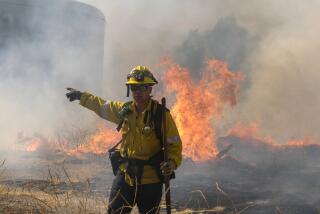Insurers Insist They Were Victims of Quackenbush Too
On June 28, the day Insurance Commissioner Chuck Quackenbush announced his resignation, key insurance industry representatives in Sacramento had little to say.
They were not, at that moment, about to express any regret or apology to the people of California for having sponsored Quackenbush as commissioner with $8.7 million in campaign contributions and then, until the scandal broke, accepting with little protest the view that he was the industry’s friend.
But in recent months the insurers have begun to more fully appreciate that Quackenbush--especially in his handling of the Northridge earthquake and in his solicitation of $12.8 million in industry money for foundations used for personal political purposes--
severely compromised the industry’s reputation as well as his own.
Now the insurers are speaking out, struggling with this, and in so doing revealing the dangers that big corporations incur when they sponsor politicians who later lose consumers’ respect.
It’s a sensitive moment for the insurance industry. The state Supreme Court just last week refused to hear the companies’ attempt to overturn a law that reopens for a year the period for some quake victims to file Northridge claims.
Although the constitutionality of this can still be litigated in lower state courts, the atmosphere is deadly. There is wide public acceptance of a notion the insurers reject--that they gave many Northridge victims short shrift.
Bill Sirola, a spokesman for the largest insurer, State Farm, handler of 208,000 of the 600,000 quake claims filed, told me this week that his company would now like “a third-party look” at how it performed.
“We’d take an arbitration judge, state auditors or an outside, independent consulting firm,” he said. “We have our rebuttal to the claims made about our conduct, our point-by-point file. . . . We’d like to lay the issue to rest, once and for all.”
Meanwhile, State Farm’s lead Sacramento lobbyist, Dan Dunmoyer, declared that the industry’s relationship with Quackenbush inexorably slid into disaster.
Dunmoyer was key in recruiting Quackenbush to run in the first place, and his lobbying firm, the Personal Insurance Federation, won new clients because of its allegedly close ties to the commissioner.
But this week, perhaps trying to recast history, Dunmoyer insisted that the Republican official actually turned out to be less friendly than his predecessor, Democrat John Garamendi.
“Both commissioners had staggering political ambitions,” Dunmoyer complained, saying that Quackenbush became overbearing in his demands for money and that market conduct examinations he used to extract insurer funds for his foundations wildly exaggerated insurer failures in the Northridge situation.
“My God, we were destroyed” by these charges, he said.
Is this over the top? I questioned in a column last spring the assertion by some industry insiders that Quackenbush was involved in a shakedown that they couldn’t resist.
If the industry was being subjected to improper pressure, why didn’t it go public or go to the authorities? I asked.
Dunmoyer now says, “If I had come to you when all this was going on . . . and said I was tired of getting kicked in the shins, you would have simply said, ‘It’s about time he got tough on you.’ ”
But I don’t agree that journalists or the attorney general would have responded that way. After all, we’re all quite keen to look into wrongdoing of every kind.
*
*
On Sept. 12, in San Francisco, in a post-mortem on the Quackenbush scandal sponsored by Smart’s Insurance Bulletin, the Assn. of California Insurance Companies and the National Assn. of Independent Insurers, participants insisted the industry was indeed intimidated.
Smart’s Sept. 29 report on the occasion stated that “because insurers believed Quackenbush was in their camp on regulatory policy, they were reluctant to publicly criticize his actions” until long after he started “bullying” them.
Alister McAlister of the Assn. of Independent Insurers was quoted as saying that “in retrospect, these companies should have told Quackenbush to go jump in the lake.”
Barry Carmody, president of the Assn. of California Insurance Companies, told the symposium he had concluded that the best check on the Quackenbush-run Insurance Department was actually an inquisitive news media.
Garamendi was quoted as saying that Quackenbush was compromised by the insurance money he took, but, for the insurers, it was “even more dangerous to give money and have your reputation besmirched by it.”
I find this exciting, because it shows that all this money that is being thrown around in politics may not simply be detrimental to the public interest, but may backfire on the businesses that give it.
I reached a more limited conclusion a dozen years ago, while covering the battle between insurer and trial lawyer interests in the Legislature and in big initiative campaigns: It seemed even then that the big contributors could often block things from happening, but their money couldn’t get them anything positive that they wanted.
Once the insurers and other big contributors realize the limitations, maybe they will be more accepting of campaign finance reform.
As to the new claims period for Northridge victims, assuming it isn’t knocked down by the courts, there seems to be quite a bit of uncertainty, even among trial lawyers, about how many people will actually make claims. After all, it’s nearly seven years since the earthquake.
Meanwhile, it continues to be important, I think, to study how the companies performed in Northridge and what their relationship with Quackenbush really was.
Industry critics, like Harry Snyder of the Consumers Union, don’t think they did well on either count. “Their hubris took us to the cleaners, with their bought-and-
paid-for insurance commissioner,” he said. “It’s terribly important we understand the excesses.”
*
Ken Reich can be contacted with your accounts of true consumer adventure at (213) 237-7060 or by e-mail at ken.reich@latimes.com.
More to Read
Sign up for Essential California
The most important California stories and recommendations in your inbox every morning.
You may occasionally receive promotional content from the Los Angeles Times.










